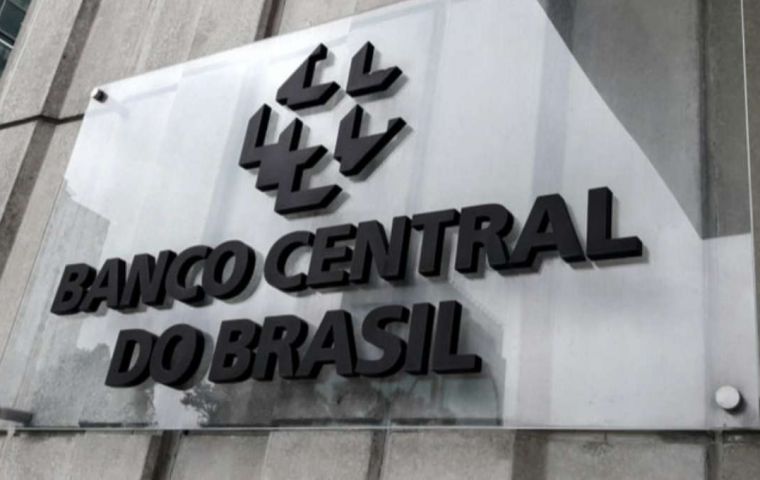MercoPress. South Atlantic News Agency
Brazil's Copom keeps Selic unchanged
 Most analysts concurred that there were uncertainties regarding the fiscal deficit
Most analysts concurred that there were uncertainties regarding the fiscal deficit Brazil's Central Bank (BCB) Monetary Policy Committee (Copom) unanimously agreed Wednesday to keep the Selic basic interest rate at 10.5% per year, Agencia Brasil reported. The measure followed through on June's decision to stop the downward cycle that spanned from August last year until March this year, during which the Selic was lowered by 0.5 percentage points at each meeting until in May it was 0.25 percentage points.
The Copom explained in a statement that the decision was motivated by the adverse external environment and the set of indicators of economic activity and the domestic labor market, which continue to be more dynamic than expected.
“The Committee unanimously opted to keep the interest rate unchanged, highlighting that the uncertain global scenario and the domestic scenario marked by resilience in activity, rising inflation projections, and unanchored expectations demand diligent monitoring and even greater caution,” the note read.
The decision, according to the committee, was aimed at consolidating the disinflation process. “Monetary policy must remain contractionary for long enough at a level that consolidates not only the disinflation process but also the anchoring of expectations around the target,” it insisted.
The Committee said it would remain vigilant and recalled that any future interest rate adjustments would be dictated by the firm commitment to converging inflation to the target.
The Selic rate is the Central Bank's main instrument for keeping official inflation, as measured by the Broad National Consumer Price Index (IPCA), under control. In June, the IPCA rose by 0.21%, below the rate recorded in May (0.46%).
So far this year, the IPCA has accumulated a rise of 2.48% and in the last 12 months, the rate is 4.23%, up from 3.93% in the previous 12 months.
For 2024, the National Monetary Council (CMN) has set an inflation target of 3%, with a tolerance margin of plus/minus 1.5 percentage points.
According to the BCB's Inflation Report released in June, the IPCA is expected to be 4% in 2024. In addition, the Focus bulletin -a weekly survey of financial institutions published by the BCB- official inflation should end the year at 4.1%.
Wednesday's announcement by the Copom regarding the Selic generated different reactions from the industry and commerce sectors. Some found that the measure spelled restrictions to economic activity, others believed it reflected uncertainty about the balance of public accounts.
The Confederação Nacional da Indústria (CNI) said it was worried that those interests would restrict Brazilian economic activity. “We hope that the Selic returns to be reduced as soon as possible. The retaking of cuts is fundamental for the reduction of the financial cost borne by companies, which accumulates throughout the production chains, and by consumers. Otherwise, we will continue to penalize not only the Brazilian economy but mainly Brazilians, with fewer jobs and less income,” CNI President Ricardo Alban stressed.
The Federation of Industries of the State of Rio de Janeiro (Firjan) contends that a sustainable resumption of interest rate cuts depends directly on the balance of public accounts. “The absence of a structural agenda of spending cuts raises the country's risk, devalues the local currency, and deteriorates inflationary expectations,” Firjan explained.
The Federation of Commerce of Goods, Services, and Tourism of the State of São Paulo (FecomercioSP) insisted that the Copom was right in maintaining the Selic and that there was no margin to decide otherwise given the pressured economy, amid growing inflation and uncertainties around the fiscal scenario. For FecomercioSP, the context may even indicate the need for a rise in interest rates, albeit small. Only a clearer fiscal position of the government could change the situation.
The National Confederation of Commerce (CNC) considered the decision of Copom prejudicial to the productive sector, for making the interest rates more expensive. But said to recognize that, due to the deterioration of the inflationary framework, the measure is important for the stabilization of the macroeconomic environment. The CNC highlighted the high sales in the retail sector, low unemployment rate at historical levels, and high disposable income. On the other hand, the CNC claimed that, despite some progress in the recovery, the fiscal area continues to raise concerns.
The Força Sindical labor union labeled Copom's decision as absurd. It said that the country continues to be a reflection of the interests of the rentiers and that higher interest rates reward speculators as Brazil was losing another opportunity to bet on production, consumption, and job creation. It also underlined that the payment of bonds by the government consumed and restricted the country's growth possibilities.




Top Comments
Disclaimer & comment rulesCommenting for this story is now closed.
If you have a Facebook account, become a fan and comment on our Facebook Page!